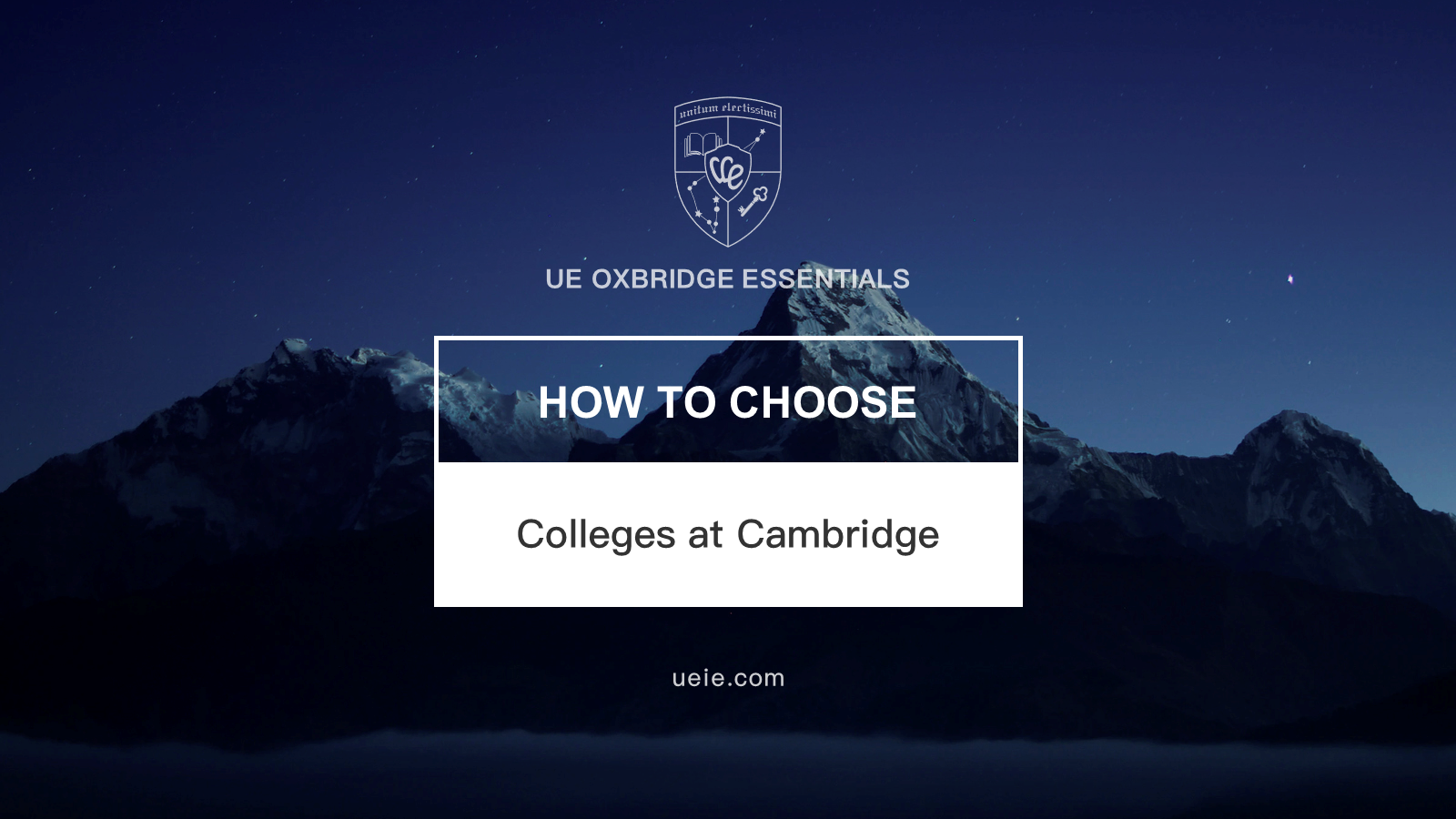If you’re seeking personalized guidance from esteemed faculty and world-class university life, adding Cambridge to your wish list is a must. However, how to choose one college that suits you best at the University of Cambridge? Here, we’ll explain what colleges are and what you should keep in mind as you fill out their applications. Embark on a journey!
Ⅰ. Understanding the Operations of the Cambridge College System
As a collegiate university, Cambridge comprises Colleges, Schools, Faculties, and Departments. It includes 31 semi-autonomous constituent colleges and over 150 academic departments, faculties, and other institutions. Member colleges enjoy a high degree of autonomy and are semi-independent institutions. They have their own governance framework, student recruitment, and student activities.
1. Colleges at the University of Cambridge
The colleges’ importance lies in the housing, welfare, social functions, and undergraduate teaching they provide.When studying at Cambridge, you’ll get the most out of what the college offers regarding facilities. Even though you are far from home, your College can be your comfy nest. Also, you will find many opportunities to mingle with previous students from various colleges in your vicinity, plus you can join all kinds of University-wide societies and clubs. Sounds great, doesn’t it?
29 colleges accepting undergraduate students:
- Christ’s College
- Churchill College
- Clare College
- Corpus Christi College
- Downing College
- Emmanuel College
- Fitzwilliam College
- Girton College
- Gonville & Caius College
- Homerton College
- Hughes Hall (mature students only)
- Jesus College
- King’s College
- Lucy Cavendish College
- Magdalene College
- Murray Edwards College (female students only)
- Newnham College (female students only)
- Pembroke College
- Peterhouse
- Queens’ College
- Robinson College
- Selwyn College
- Sydney Sussex College
- St Catharine’s College
- St Edmund’s College (mature students only)
- St John’s College
- Trinity College
- Trinity Hall
- Wolfson College (mature students only)
2. Schools at the University of Cambridge
Schools at the University of Cambridge are a broad administrative grouping of related faculties and other units. Each has an elected supervisory body known as a Council, composed of representatives of the various constituent bodies. The University of Cambridge maintains six such schools:
- Arts and Humanities
- Biological Sciences
- Clinical Medicine
- Humanities and Social Sciences
- Physical Sciences
- Technology
3. Faculties and Departments at the University of Cambridge
The faculties of the University of Cambridge are based on more detailed classifications of academic fields. They are responsible for integrating the teaching and research affairs of the departments to which they belong, while the departments directly carry out the teaching and research affairs.
Ⅱ. Do Certain Colleges Excel in Specific Courses?
The University of Cambridge, which offers over 30 undergraduate courses covering over 65 subject areas, is renowned for its specialized approach to education. Colleges’ histories and cultures strengthen specific strengths in particular areas, creating an atmosphere where certain disciplines thrive and excel.
- For example, Trinity College is one of the most prestigious colleges in Cambridge. In terms of arithmetic and science, it’s a powerhouse. Isaac Newton was among the many eminent mathematicians produced by the university. As you walk through its corridors, you cannot help but feel the mathematical magic all around you.
- The humanities are a strong focus at St. John’s College, another great institution. Languages, literature, and records discover a unique area here. University environments foster a deep appreciation for the arts, encouraging college students to express their creativity in various ways.
- Lastly, there’s King’s College, which is renowned not only for its chapel but also for its lively music scene. Students interested in music, art, and drama find a nurturing ground to hone their skills in this area of creativity and way of life.
The colleges of the University of Cambridge all cover a wide range of courses in different academic fields. Still, there are also cases where some colleges do not offer specific courses.
Meanwhile, each of those colleges contributes to the rich educational tapestry of Cambridge University in its unique way. At Cambridge, there’s a university for every student, whether you’re interested in maths, records, or art. Finding the one that resonates most with your educational interests and aspirations is the key.
Does your preferred college offer the course of your choice? You can check it out on the Cambridge’s official website.
Ⅲ. Selecting Between Cambridge Colleges: A Guide for Decision-Making
The following tips can help you select a Cambridge College:
The Tompkins Table: The Tompkins Table is a yearly ranking report of the Colleges of the University of Cambridge in order of their undergraduate students’ performances in that year’s examinations. Peter Tompkins, a third-year undergraduate mathematics student at Trinity College, created the table in 1981
The table allocates 5 points for a First Class degree, 3 points for an Upper Second (also known as a 2. i), 2 points for a Lower Second (a 2. ii), 1 point for a Third and no points for someone only granted an allowance towards an Ordinary Degree. The result is expressed as a percentage of the total points available.
The scores in each subject are then weighted to a common average to avoid the bias toward colleges with higher proportions of students entered for subjects that receive higher average grades.
It should be noted that the University of Cambridge does not officially endorse the rankings. Still, it has become a reference standard for measuring the academic strength of Cambridge University colleges.
The table below shows the ranking of colleges at Cambridge University in 2022:
[ ]
Take your age into consideration: Hughes Hall, St Edmund’s College and Wolfson College specialize in serving students at least 21 years old and have centers designed specifically for them.
Analyze the size of the university: Take a look at the number of college students enrolled. For example, Corpus Christi College is one of the smallest colleges at the University of Cambridge, enrolling only about 85 students each year, so there is a close relationship between students of different grades. Meanwhile, Homerton College usually has the largest number of students in Cambridge, and the college atmosphere is more enthusiastic, with more extracurricular activities.
Examine lodging options: Check if motels are available on-site or at College-owned homes. Some colleges have accommodations in century-old buildings with beautiful views and close proximity to the city center and university facilities, while others have more modern accommodations with heating, laundry and kitchen facilities for a more comfortable living experience.
Check out the different activities: Each college offers a wide range of activities, from news broadcasting to music, drama, art, sports, and volunteer opportunities, to ensure that every student has something fun to do.
Check the admission statistics: It is essential to understand the admission status of each college in advance when making a college choice.
1. The table below shows the applications from outside the UK.
[ ]
2. The table below shows the admission statistics by gender and College in 2022.
[ ]
More information can be found on the Cambridge website.
Ⅳ. Avoiding College Decision Pitfalls: How Not to Choose a College
Application difficulty: Applying to a less renowned college may not increase your chances of acceptance.
Traveling time: With Cambridge’s compact dimensions, it is possible to travel between campuses on foot, by bike, or by bus.
Age of the College: A college’s age is only sometimes a factor in how students enjoy themselves; all colleges offer anticipated centers and assist with particular traditions.
Previous contact with a college: Contacts with a college in the past may not affect your application or recognition chances.
Ⅴ. Does it matter which College you go to Cambridge?
While all colleges at Cambridge operate similarly, there are some differences in academic traditions, locations, and aesthetics.
However, whether you have a preference for tradition or atmosphere in a specific college, or you don’t care which college you attend, you can expect a world-class education and university life at Cambridge University.
Ⅵ. Can I change my College preferences?
You are able to change your choice of College preferences up to the point of receiving a conditional offer of admission to the University. You can only request a change once.
Ⅶ. What are the differences in admission requirements between colleges?
Admission requirements may vary slightly from college to college depending on the year of entry, the course applied for, the nationality of the applicant, etc. However, Cambridge University provides the minimum application criteria for students’ reference. Check the Cambridge University website for each college’s specific entry requirements.
Ⅷ. Which is the best college under Cambridge?
If you ask which is the best college at Cambridge University, some people might say Trinity College because it is one of the largest and most prestigious colleges in Cambridge; some might say King’s College because it is famous for its strong academic strength and has educated many outstanding scientists and innovators; others might say St. John’s College because it is one of the oldest colleges in Cambridge and not only has top academic rankings but also has a wealth of cultural and artistic activities.
However, each college has its own traditions, cultures, and atmosphere. Choosing a college at Cambridge is not about finding the best one but rather discovering the unique characteristics that suit you best.
Ⅸ. What is The Pool in the University of Cambridge
Cambridge wants to ensure that the best applicants are offered a place each year, no matter which college they originally applied to or were allocated to. If one college is impressed by you but doesn’t have a place for you, the Pool will play its part.
If you are an impressive applicant, your first choice college may put your application forward for consideration by other colleges. Colleges would rather admit a strong applicant who applied to another College than a weaker applicant who applied directly or was allocated to them.
The processes of the Pool are:
- look at applications that were assessed by another College first
- consider these applicants for courses where they have places left
- make offers to the best applicants
1. The Pools at the University of Cambridge are:
Winter Pool
If you made an application in October and were interviewed in December, your application may be put forward to be considered by other Colleges in January. A few applicants in the winter pool may be invited to attend another interview in January.
Cambridge will notify you of their decision when all applications have been reviewed. If no College can offer you a place, your first choice College will let you know the decision by the end of January.
Summer Pool
In August, Colleges will consider a few applicants for any remaining places that they have. This happens after applicants receive their exam results and Colleges know which offer holders have met the conditions of their offer.
Colleges will consider your application again if you are an offer holder who has narrowly missed the conditions of your original offer or you weren’t made an offer in January or April and you apply for reconsideration.
Spring Pool
If you made an application during the mature student March application round, your application may be put forward for consideration by the other mature Colleges.
If a different mature College does not offer you a place, your first choice College will let you know by the end of April.
Ⅹ. What UEIE can help during your application?
UEIE specializes in Oxbridge Planning, Oxbridge-Prep, and Olympiad-Prep and has accumulated more than 40 high-quality courses, 500+ video lectures, 100+ students admitted to Oxbridge G5 Ivy League schools, and 8000+ registered users. At UEIE, we provide students with personalized guidance based on extensive experience and official statistics. UEIE will tutor you on all aspects of the application, including personal statements, admission tests, and interview skills.
Choosing the right college at Cambridge University feels like finding the missing puzzle piece. You’ll discover the ideal fit for your academic adventure with our guidance.
Unlock the potential of our Oxbridge Premium Courses by scheduling your free consultation or enrolling now to triple your chances of success.
XI. When exploring Cambridge's colleges and expecting your university life:
Everyone’s reasons for choosing their college differ. But fear not! After reading our article and the college profiles on the Cambridge website, you can make a choice based solely on your instincts and feelings.
Whichever college you attend, you will enjoy the unparalleled campus life and academic atmosphere of the University of Cambridge with UEIE supporting you.


